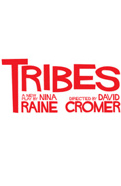Tribes Star Russell Harvard on His Deaf Heritage and Joining a New Off-Broadway Family
About the Author:
Russell Harvard may be making his off-Broadway debut in Tribes at the Barrow Street Theatre, but this talented New York newcomer is no show-biz rookie. On film, Harvard is best known for his portrayal of the adult H.W. Plainview in There Will Be Blood and wrestler Matt Hamill in The Hammer. In Tribes, Harvard stars as Billy, a deaf twenty-something who struggles to be heard in an outspoken hearing family. When Billy learns sign language and finally finds his voice, his relationship with his self-involved parents and siblings is turned on its head. Below, Harvard writes of his experiences as a deaf actor, the limitations of American Sign Language, and his idea for a new way to communicate with (or play pranks on!) his hearing friends.
![]()
I first read Nina Raine’s Tribes several months ago and was drawn to the character of Billy for many reasons. We are vastly different people, but we have a common and familiar foundation. Billy was born deaf, and so was I—but unlike Billy, I come from a deaf family. My mother, like Billy, was born deaf and raised by a hearing family. And similarly, my mother didn’t learn American Sign Language (ASL) until the age of six, when my grandmother enrolled her in the Texas School for the Deaf (TSD). It was there that she met my father, who was born to deaf parents. They both graduated from TSD and I’m proud to say I’m the third deaf generation, as well as the third generation of TSD alumni in my family. My mother’s story is a lot like Billy’s—because of her personal history, I understand him, who he is, and who he hopes to become.
This understanding of Billy’s background allowed me to fall into character surprisingly smoothly: I became Billy in an instant on the first day of rehearsal. Those first rehearsals were slightly frustrating because I crave to absorb and understand everything that is happening in the room, but there were so many overlapping conversations that it was hard to pick everything up.
That first rehearsal experience was reminiscent of a surreal obstacle I faced in 2004 when I traveled to Amsterdam with a deaf performing troupe from Washington, D.C. We were invited to a huge deaf international party at a nightclub 40 kilometers away. Two co-workers and I decided to attend the party, while the rest decided to hit the hay—but I didn’t know what I was about to get myself into. When we entered the club, I saw that signing was the mode of communication most people were using, but I couldn’t understand what anyone was saying. There were as many as five different languages in sign happening in front of my eyes. My co-workers disappeared into the crowd and I found myself frustrated that I couldn’t understand what people were saying.
Luckily, I ran into a friend from Gallaudet University, and he translated for me. Later that night, he told me that to communicate more efficiently I should learn International Signs. When I returned to school the following semester, I registered for a Visual Gesture Communication course. The class opened my eyes to the fact that communication is possible through gesture and that a specific language isn’t necessary. Go figure!
The skills I acquired in the visual gesture course have helped me navigate situations in which communication was an obstacle, which came into play throughout the rehearsal process for Tribes. Now, it would be far out if my Android phone had an app that could translate English speaking to English text! That would revolutionize my life. I’d like to eavesdrop on a conversation in the subway or listen in on my fellow cast members in the dressing room next to mine.
Everyone at the Barrow Street Theatre has made me feel very welcome, and life in NYC is rad! My co-stars and stage crew members are learning ASL, and it brings me a great deal of joy to see them simply trying to sign (speak) my language. I am grateful to the writer, director and producers for giving me an opportunity to show my work in this unforgettable production.
